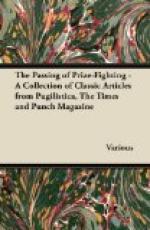* * * * *
Miss M.E.F. IRWIN, whose previous books I remember to have greatly enjoyed, has produced for her third a story of much originality and power, called Out of the House (CONSTABLE). The title may perplex you at first. It comes from the struggles of the heroine to wrench herself free from encompassing family ties and the tradition of intermarriage, in order to join her life to the outside lover who calls to her. You might therefore consider it, in some sense, a story of eugenics, but that its outlook is emotional rather than scientific. Yet the Pomfrets, as a result of family pride and over-specialization, had become a sufficiently queer lot to warrant a normal girl in any violence of house-breaking to be free of them. Therein of course lies the cleverness of the book; it is full of atmosphere, and the atmosphere is full of dust, Pomfret dust. You can feel how heavy to rebellious lungs must have been the air of the Pomfret houses, where lived Philip, the intriguing father, and his sons Anthony (a little mad) and Charles (much more mad, but with at least the instincts of a lunatic gentleman). It is not, you will guess, precisely a lively tale, but the force of it is undeniable. Miss IRWIN has now more than ever proved herself a fastidious and careful artist, with a touch of austerity that gives weight to a tale so frankly one of sentiment, and she will, I hope, continue to keep her work above the ordinary level.
* * * * *
The Wane of Uxenden (ARNOLD) seems to be one of those novels which may be classed as worthy in intention without being exactly happy in execution. Miss LEGGE has a desire to warn us all against the perils of monkeying with spiritism, and she has chosen the method of making it tiresome even to read about. Well, it is a method certainly. Uxenden was a nice old family, which had come down to cutting its timber while a rich Jewish soap-and-scent-manufacturer sat rubbing his hands on a slice of the property, waiting for the rest of it to come his way. Uxenden eventually waned entirely, and without tears so far as I was concerned. I feel sure Mr. La Haye (ne Levinstein) would make a better landlord than the old squire, in spite of the prejudices of the countryside.... No, I am afraid it would be stretching a point to promise you any great entertainment from this well-intentioned but rather woolly book. Brother Jenkins, the fraud, of the Society of Seven, is about the most entertaining of the marionettes.




